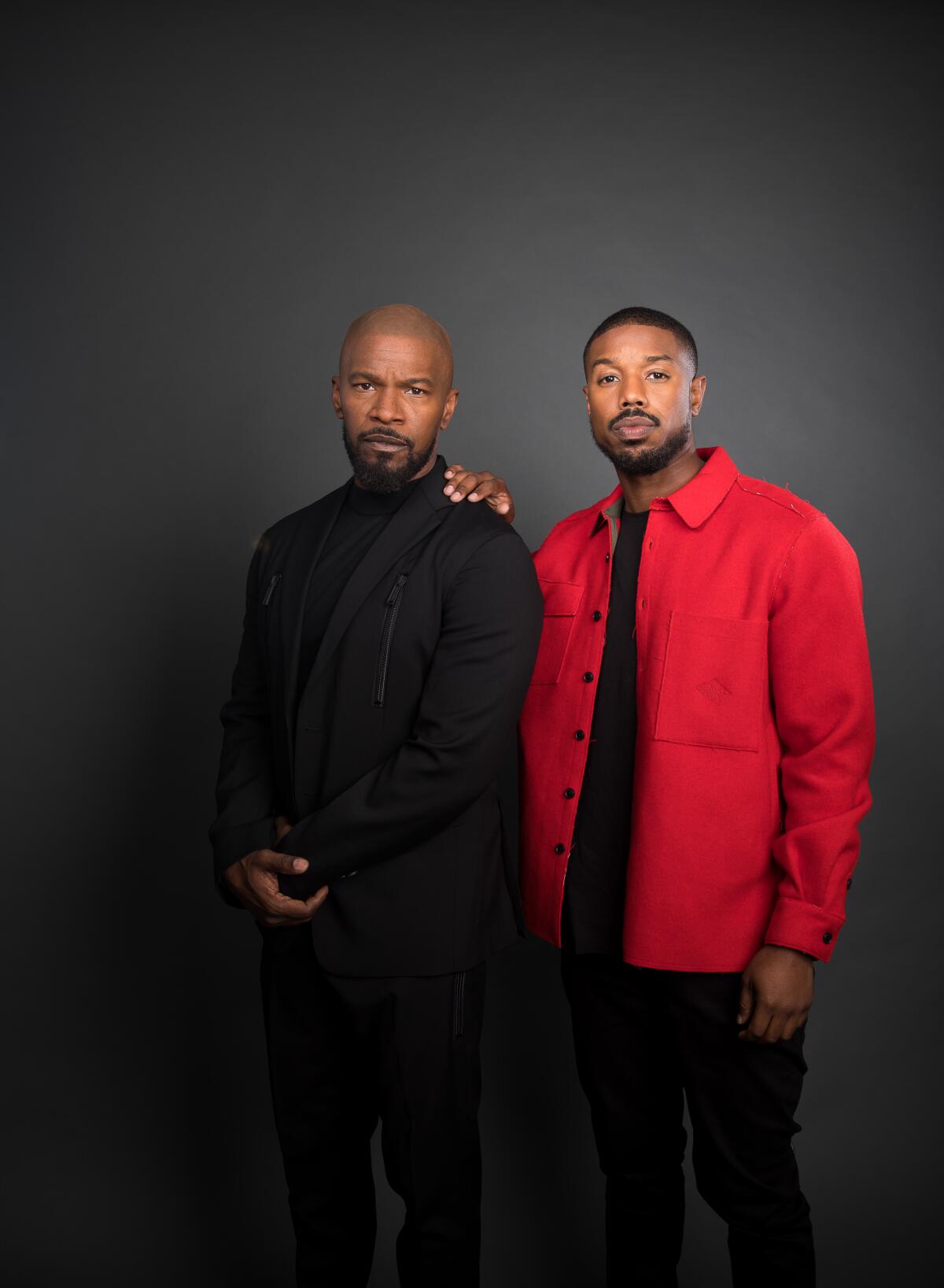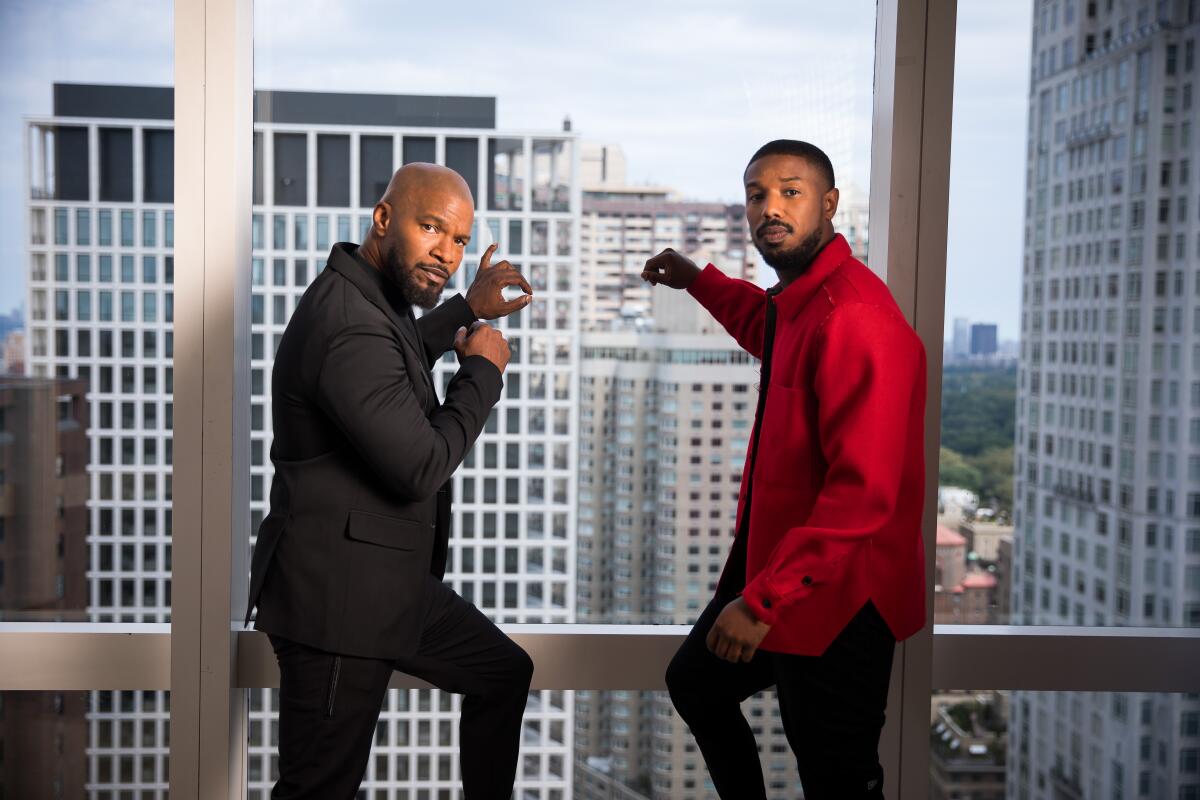Jamie Foxx and Michael B. Jordan see God’s work in their new movie, ‘Just Mercy’

- Share via
Michael B. Jordan was a kid, maybe 8 years old, maybe younger, when he first met Jamie Foxx. There’s a 20-year age gap between the two of them. Sometimes, in conversation, Jordan will recall thinking of Foxx as an uncle or a big brother. Never dad, though, because that’s not going to go over well with anyone.
When Jordan moved to L.A. from Newark, N.J., to pursue acting full time in 2006, he called Foxx to get the lay of the land. At the time, Foxx was playing in a weekend basketball league at Santa Monica’s Crossroads High School. “Come over and join,” Foxx told him. Jordan, then 19, took him up on his offer, and his team won a championship in his first year.
“I think they only let him play one more year after that,” Foxx says, putting an arm around Jordan. “They were very sensitive to him, because they thought it was unfair for him to look like that and then come and beat our ass on the court too.”
Jordan laughs, noting he used to get a lot grief about his name — until he stepped on the court. “I’m always looking for that extra motivation,” he says.
“Michael B. Jordan was really like the Michael Jordan of this league,” Foxx says. “I saw him do one move, he was coming down the court with the ball, and he did a jerk and it was like he disappeared. Some actor said, ‘I got him ...’ and then, ‘Where the ... is he?’” Foxx shakes his head, smiling. “There was a lot of emotions there. Word spread. ‘Don’t bring your girlfriend to the gym if Michael B. Jordan is playing.’ It was suuuuuper-competitive.” He pauses and looks at his friend. “Maybe we shouldn’t have let you in.”
The camaraderie Jordan and Foxx established competing against each other paid off more than a decade later. Fresh off “Black Panther,” Jordan was producing “Just Mercy,” an adaptation of civil rights attorney Bryan Stevenson’s memoir about his work in freeing wrongly convicted people. Jordan, playing Stevenson, pressed for Foxx to be cast as Walter McMillian, an Alabama man convicted of murdering an 18-year-old white woman despite a lack of evidence and an abundance of witnesses vouching for his alibi.
“He was like, ‘I want you, and I want to remind people about you,’” Foxx says, sitting across from Jordan during a late lunch before the movie’s September premiere at the Toronto International Film Festival. “And that’s a big thing in our business, for someone to look at you and say, ‘Hey, man, I think this will be great for you and also great for what I’m trying to do.’”
When the first day of filming rolled around, Jordan was glad he’d made the call. The night before, he woke up in excruciating pain. His left side was numb and throbbing. Jordan figured it was a pinched nerve. But the discomfort — which he calls the worst pain he has felt in his life — continued for a month.
That first day on set with Foxx found Jordan lying on the floor between takes of a scene depicting Stevenson and McMillian meeting in prison. Foxx sat down next to him, placed his Bluetooth speaker between them and began playing gospel songs of comfort, like Tamela Mann’s “Change Me” or Fred Hammond’s “No Weapon.”
“I played the piano in church,” Foxx says. “I know the songs. And you listen to those words ... this is the Deep South. And when you heard those words, up against what he was doing and what he was going through, that’s God saying, ‘I’m going to put a cross on you. This is your cross to bear for this movie.’”
And just as Jordan used the taunts about his name on the basketball court at Crossroads High, he employed all the things he was now enduring — the frustration, the lack of sleep, the physical pain — toward pushing his mind to focus on the task at hand. No rest? Stevenson didn’t sleep much either, grinding through five or six cases at a time. Disheartened? Stevenson faced long odds and daunting circumstances in helping his poor clients find justice.

“I’m always trying to find things to add an extra layer,” Jordan says. “To Jamie’s point, in that moment, I couldn’t recognize it, but that was something I had to go through. What’s more important? Temporary pain or a movie that’s going to last forever?”
“We were really worried about him,” Foxx interjects. “I felt that, bro,” Jordan answers, almost in a whisper. Foxx called a physician friend to come to Atlanta and examine Jordan. The doctor couldn’t find the problem, telling Jordan: “Sometimes when you can’t diagnose something, that’s something God is putting on you.”
And here, Foxx’s Baptist upbringing kicks into gear and he starts delivering a sermon to Jordan while he’s picking at his salmon-and-vegetables lunch.
“God put something on you, then you put it back on God, and when that happened, the movie came to life,” Foxx says. “You’re saying those incredible speeches in the courtroom and you got a standing ovation from the extras who had tears in their eyes from your words.”
Destin Daniel Cretton, who co-wrote and directed “Just Mercy” (which opens in Los Angeles and New York on Christmas Day and will go wide on Jan. 10), didn’t know the depth of the connection between Foxx and Jordan until they began filming their scenes together. He quickly realized he wouldn’t have to offer much encouragement to his stars because they were already each other’s biggest champion.
“Any time the two of them were in a scene, it was like watching two jazz musicians craft a melody,” Cretton says, noting the last moment of the movie when you can see Foxx give Jordan a fist bump and mouth the words “good job.”
“Of course, it’s Walter McMillian giving Bryan Stevenson the fist bump, but it’s a little bit of Jamie Foxx giving it to Michael B. Jordan too,” Cretton adds. “That mixture is present throughout the movie.”
Ultimately, it was found that Jordan had a slipped disc in his back that was pushing against a nerve, causing the pain. The impact of the boxing scenes in the two “Creed” movies might have caused this. It might have been worsened by Jordan dropping weight after the “Creed” sequel to make “Just Mercy.” Or, if you believe Foxx and Jordan, it might have been brought about by a higher power.
“God works in mysterious ways,” Foxx says. “That’s all I’m saying.”
More to Read
Only good movies
Get the Indie Focus newsletter, Mark Olsen's weekly guide to the world of cinema.
You may occasionally receive promotional content from the Los Angeles Times.











